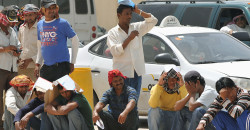Iraq's Labor Minister urges swift approval of Pension and Social Security Law

Shafaq News/ Iraq's Minister of Labor and Social Affairs, Ahmed Al-Asadi, announced on Tuesday that the State Council has yet to approve the pension and social security law, despite its passage in the legislature a year ago.
Speaking via a virtual address during the launch of the social security campaign, which was covered by Shafaq News, Al-Asadi emphasized that "the Pension And Social Security Law provides a genuine and suitable opportunity for all workers in the private sector, granting them equal rights to those in the public sector. The previous law offered no guarantees for workers."
He explained that the enactment of Law No. 18 of 2023 allows workers to register with the retirement and social security office, providing critical protections for laborers.
“A full year has passed since the law was legislated, yet the ministry is still awaiting the council's approval of the implementing regulations…we urge for a prompt endorsement and publication of the law's guidelines as approved by the Parliament.”
Al-Asadi characterized the law as comprehensive, stating that it may be one of the best labor laws in the region, and the most significant legislations enacted in Iraq since 2003, “supporting the private sector and providing workers with considerable freedoms."
About SOCIAL SECURITY LAW
On December 1, 2023, Iraq’s government enacted a new social security law, reforming the country’s social insurance pension program for private-sector workers. Key changes include expanded coverage, new registration fees for foreign nationals, an increased combined contribution rate, adjusted covered earnings, updated retirement options, and revised benefit calculations. The law also broadens social protections by introducing paid maternity leave and public unemployment insurance. Approved by Iraq’s parliament on May 17, the law followed years of negotiations among government, employer, and worker representatives.
Key Provisions:
- Expanded Coverage: The law now includes self-employed individuals, informal-sector workers, and contributing family members, extending beyond the previously covered formal private-sector employees.
- Foreign National Fees: Employers must pay a one-time registration fee for each foreign national: 750,000 dinars (US$573) for registrations before December 1, or 2 million dinars (US$1,528) thereafter.
- Increased Contribution Rate: Combined contributions rose from 17% to 25% of monthly earnings for non-oil and gas sector employees, with the government covering the additional 8% for Iraqi employees. Rates remain higher in the oil and gas sector.
- Retirement Options: Men can retire at age 60 with 20 years of contributions or at 63 with 15 years, while women can retire at 55 or 58 under similar terms.
- Benefit Calculations: Pensions are now based on average earnings over the last 5 years of employment, with the maximum monthly pension capped at 80% of reference earnings.
The law also introduces paid maternity leave and public unemployment insurance, marking a significant step in expanding social protection.
